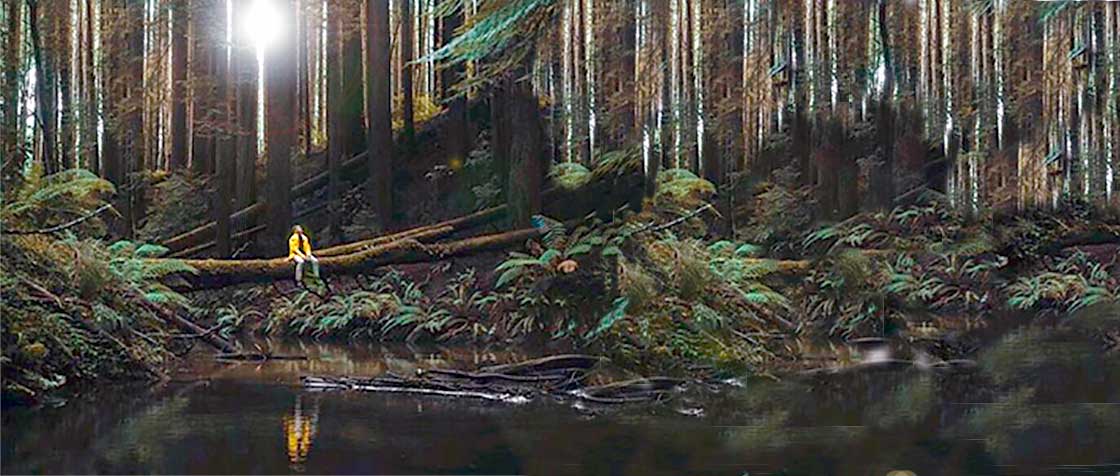
The ecology and restoration of the gospel are subtly intertwined. It is not a matter of the gospel, it is not a doctrinal concept and therefore there is no ecological plan in the restoration to present to whoever asks for it.
However, the teachings of his doctrine place us at the point of a profound balance between ourselves and the environment. Without an ecological epigraph and without the approval of the champions of this mark, the gospel of Jesus Christ shows where the seeds or first gears of a filial relationship with the earth are. The main one of them, the family. In it we begin to form ourselves and see the world, it is the matrix of our mother earth. However, it is not mentioned as an integral part of ecology on our planet.
The marriage covenant.

The marriage agreement provides the couple with a structure that is not elaborate, but genuine before the world and its inhabitants. By stating in the proclamation that the family is born in a relationship «as husband and wife,» it places us clearly in nature and civilization. It adds to the natural attraction of the sexes, a legal dimension to society and its vicissitudes.
The family, even older, and marriage are bodily constructions, they are born before their definition, they are the expression of their biology and they owe their existence to no one. For us it is instituted by God and for anyone it should at least be instituted by nature. There is nothing more anti-ecological than to question something that is born in the steppes, among forests, hunters, gatherers, ranchers, farmers. All of them, fathers, mothers, husbands and wives.
To redefine those meanings, in the name of progress, seems to me to be of enormous fatuity and petulance.
The family project is long-term. On the contrary, the individual focuses on the present since all resources coincide in the interest of only one. However, we can find couples of individuals, who barely get out of the personal interest to touch slightly that of spouses.
A family saves resources for the future present need in the children. Therefore, there is a brake on the consumption of the immediate in favor of the future need. There is no institution that manages resources like it and invests as much in R&D and education as a family.
Attacking her, the cell of society, or her words that form her protective membrane, becomes a carcinogenic activity.
The Church of Jesus Christ, where she is the nucleus of his interest, thus participates in promoting a more rational and natural management of resources.
Family and nature
Marriage and the family are not institutions of society but the germ of society. Therefore, since it has existed since time immemorial, it has an ecological component. It has known how to converse with the environment through the millennia and bring us here. It has done so through wars, plagues and disasters. Therefore its form and constitution should be observed rather than discredited by those who with 1/4 of a lifetime believe they are authorized to judge hundreds of generations.
The family has no ideology, it has an archaic form. And it can be interpreted according to the time where one lives. But it is born literally from the earth that God created. Like other creatures, father, mother, children are the consequence of their nature. Their customs, races, languages and cultures are related to the land, the sea, the rivers and the wind. However, there are destroyers, who always place an ideology at the head of everything, thus denying the earth the maternity of its works. These ideologies come at the last minute to invent everything.
La ecología y la restauración del evangelio, sección 59
La herencia familiar

The projection of the family in the future needs angles that add up to more than 180 degrees. Because its geometry aspires to curved spaces, invisible behind the horizon. By exploring with faith a future that it cannot touch, parents must necessarily extend their attention and interest to the strange angles of hope. Hope in prosperity and in a future for children.
The law given by the Lord to the saints to live in Zion is found in section 59.
«For those that live shall inherit the earth,» (D&C 59:2)
Inheritance comes from haerentis (to be united or adhered to). Inheritance comes from the Latin hereditare (to receive something by being united to a family). Inheritance and family go together, because by persisting tangible and intangible property, in time, it is preserved. That requires care, observing rules, remembering and preserving. In short, to foresee the future in order to continue the present. So the family inheriting the land works on its conservation, not extortion.
Thus, in the ecology and restoration of the gospel, the family resembles the forest on a hillside that retains the shape of its environment in front of the elements. It conserves the human habitat through the invisible roots of its affections. Deeply rooted, husband and wife, land and trees, hold a place to dwell.
Graduates

To consider ourselves urbanizers in the modern, licensed in the uncreated by us, to go to that sacred place and to attribute to the «trees» an unjust heteropatriarcado on the earth. That is as arrogant and belligerent as the word itself. With six syllables, he is not yet in the RAE, nevertheless, with determination he comes with his felling.
I remember when I was a child in 1968, seeing my parents sitting at the table in the living room, which was both a kitchen and a bedroom. With invoices and paper they considered our expenses and income. They talked about what they could or couldn’t do, how long to wait. That scene conveyed tranquility to me, they accompanied the security that soon the rains would come, they were part of the same cycle.
Their intelligent behavior provided us with future well-being. At the same time, although in works far from the earth, they used the same foresight and care as the one who sows and gathers at the right time. The same procedure my wife and I used, a habit inherited from our ancestors.
Actually, family is the way the earth wants us to know it. Their care is a prerequisite for appreciating the world.
The strength of the earth
«they shall receive for their reward the good things of the earth, and it shall bring forth in its strength.» (3)

This mentioned force is unknown to us. There is no territory on earth where these laws are lived in order to be able to know this strange force foreign to ours. We are currently doping the earth with nitrogen fertilizers, forcing its production at the risk of contaminating its aquifers with nitrates and phosphates. Logically, we think that, without this exploitation, we would not be able to feed the current population of the earth.
However, in section 59, the Lord presents us with a different context than the current one, a consumption of resources modulated by his laws. Therefore, we cannot apply the judgment of our own.
For example, when he tells us «Thou shalt love thy neighbor as thyself» (6) provides us with a counterweight to selfishness. If this criterion were applied to the economy, industry or politics, it would create an ecosystem very similar to the natural one, but with the greater light of the human being. As it says in Psalms.
The law of the Lord is perfect, converting the soul: the testimony of he Lord is sure, making wise the simple. The statutes of the Lord are right, rejoicing the heart: the commandment of the Lord is pure, enlightening the eyes. (Ps. 19:7-8)
This ecological condition of its law, which is born, like commerce and economics, from human nature itself, is not dogmatic. It is not an intellectual elaboration as Marxism or positivism is, but the legal expression of our own nature. Therefore, to see the ecological dimension of the Gospel is not about knowing a regulation but about lighting a path using its light.
The gospel of Jesus Christ contains the forms and ethics of a natural relationship with the earth as we shall see below.
Gratitude
«Thou shalt thank the Lord thy God in all things.» (7)

The gratitude is to revalue the goods received. Those things and affections that time tarnishes and gives for wasted. To thank is to re-polish the dishes that we use every day and while we do it we recognize again the first value. So too is renewing our family ties with determination, thus pointing the way to the often wandering emotions.
Gratitude comes from gratia (honor and praise paid to another) is recognition. The revision that invites us to do thankfulness in all things seeks reflection and reconsideration. Quite the opposite of extortion, a word used in section 59 to illustrate the dealings with land «not in excess, nor by extortion» that comes from extorquere (taking something violently out).
To thank is to use again and to preserve, as we do with our soul and its memory, is to remember and meditate. Thus, our old scriptures, keep in their corners and wrinkled leaves, the memories and knowledges that more and more, are read in our face. The natural rhythm of maturity unites us both. To be grateful is also to preserve.
Does that happen with tablets, dear reader? Is there time to thank?
By giving thanks for the food on the table, we recognize that what is on top is not something owed to us. With humility we receive «…and all things are given [us]which are expedient unto man.» (2 Nephi 2:27) thanks to the land and our labor. We see that our strength, by itself, would not work the miracle and we participate with periodic prayer of thanksgiving in the same cycle of the daily Sun the annual seasons and the rains in their time. Thanksgiving is an ecological value that helps us to synchronize with the creations, forming part of the whole.
The Sabbath Day
«And on this day thou shalt do none other thing, only let thy food be prepared with singleness of heart that thy fasting may be perfect, or, in other words, that the joy may be full..» (13)

The remoteness of the land and the industrial accent on the use of its fruits suggests that getting them is a due right, a transaction. A product made by third parties. Then we can leave the cycle of gratitude and enter the alley of demanding demand.
Preparing our food with simplicity puts our senses in contact with the fruits. This use of our time to carry out life-sustaining tasks is deducted from its expenditure on other tasks outside it. This daily ministration is an «ordinance» of love. To feed our own with simplicity of heart, is to turn water into wine, it belongs to the «priesthood» of daily life, a sample of simple love for our own. Wasting that time and delegating it to others impoverishes the soul, stripping it of the ancestral ways of transforming itself. So do the fruits of the earth in the hands of our loved ones.
Just as bread and water are «transformed» into the holy supper in an opportunity to remember Christ. To prepare them with simplicity of heart, makes us see the world, touch it and smell it. And through these windows the heart rejoices, the body is invigorated and the soul is animated.
To lose this millenary practice is to separate oneself from mother earth. It descends us from its axis, which spins long before we arrive.
«And inasmuch as ye do these things with thanksgiving, with cheerful hearts» (15)
Full enjoyment on the day of rest also includes the cessation of unnecessary activities. If worldwide activity decreases by about 1/7 once a week, our impact could be greatly reduced. At the same time it would increase our sight, hearing and other senses of gratitude.
The abundance of the earth
«…the beasts of the field and the fowls of the air, and that which climbeth upon the trees and walketh upon the earth; Yea, and the herb, and the good things which come of the earth, whether for food or for raiment, or for houses, or for barns, or for orchards, or for gardens, or for vineyards;» (17-18)

What does the Lord call the abundance of the earth? In verse 17 and 18 he makes this clear. They are things «…made for the benefit and use of man, both to please the sight and to gladden the heart; yea, to be food and raiment, to taste and smell, to invigorate the body and animate the soul.
The reader should judge those goods or activities in his life that fall into this category.
According to Zygmunt Bauman, in his work «Liquid Modernity» in times past, desires obeyed needs. Then he went on to create them, later to eliminate time in their attainment, the instantaneous. Now what moves us is the yearning. A type of invertebrate desire, which is not even constructed, but materializes involuntarily.
All this far from abundance to invigorate the body and animate the soul.
The Gospel teaches us to value the good things that the earth produces, seeking the slow joy of the soul and not the instant satisfaction of longings. This stimulates containment, savings, planning of effort and expenditure, control of emotions. It adapts us to natural times and not to their extinction in liquid modernity.
The abundance that we require today to live, possibly would have eliminated a child Jesus in the plans of a modern family.
The new liturgy
Ecology and restoration of the gospel are contradictory to impulsive consumption.
Buying has become the expression of our identity, the liturgy of our existence. The commercial centers are the new cathedrals, supplanting with their offers the old foundational stories.
The Gospel of Jesus Christ speaks to us of sobriety, use, please, rejoice, taste, smell, invigorate and encourage. On the other hand, in today’s abundance, use does not deteriorate with time but with interest, but interest is so volatile that it disappears almost in the act of acquiring.
Bauman tells us «To keep things for a long time, beyond their «expiration date» and beyond the moment when «new and better», «superior» replacements are offered, is really a symptom of lack. (Page 133)
Therefore, we receive communion in shopping malls. By buying unnecessarily we participate in the commandments of the world. In always remembering the need to belong to that abundance of man. So that we always have with us the equation to buy = to be.
Ecology and the Restoration of the Gospel

There are no instructions for Latter-day Saints on how to be a good environmentalist. We live in societies aware of recycling, in less polluting cars, more efficient appliances. As citizens we act with more and more responsibility. But these changes, although positive, are steps forward without a clear origin. They are solutions to problems, but not manifestations of nature or human conditions.
The gospel adds to all this, which has been achieved, the ecology of restoration. It is based on ideas that have no principle. They have always existed. Fathers, mothers, grandparents… All these roles have been sacrificed in liquid modernity.
There are big projects to improve our relationship with the environment. But the gospel teaches us to be frugal, sober and austere, and even though we are satiated, «[we collect] of the fragments that remained twelve baskets full.» (Matt 14:20) Those baskets would change the world, but we prefer the volcanic roar of media projects to the buzz of a bee in the field. Notwithstanding the sizes, it is these small ones that sustain life.
A solution to global warming?
«Yea, flesh also of beasts and of the fowls of the air, I, the Lord, have ordained for the use of man with thanksgiving; nevertheless they are to be used sparingly;» (89:12)
How much would the greenhouse gases caused by animal husbandry diminish if we were to heed the Lord’s advice?
According to Greenpeace and other studies, «The exacerbated consumption of meat and other animal products from industrial livestock farming is one of the most important food issues of our time. Its consumption in developed countries has reached totally unsustainable levels.»
A little buzz

Cost savings are vital to avoid damage to the environment. An efficient human society with a balanced axis is a lesser burden on the environment, to a degree that few imagine. The impact of our delirium is transmitted to the earth, we are united to it in solidarity. Who can assess the vibrations and consequences of the consumption of alcohol, tobacco and harmful drugs?
To live the word of wisdom would bring upon humanity «health in their navel and marrow to their bones; and shall find wisdom and great treasures of knowledge, even hidden treasures» (D&C 89:18).
The simple teachings in ecology and restoration of the gospel are like the flapping of bees. They are only known when they are heard. And to listen to them one needs to stop participating in the liturgy of the world’s abundance.
To underestimate them is not to be grateful for them. Without bees the world would disappear and enormous resources would have to be spent on doing its simple work. Listening to the creator of the bees would make us as wise as they are.

Dejar una contestacion